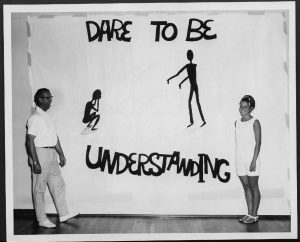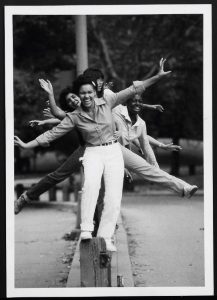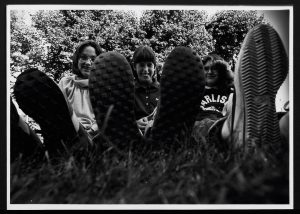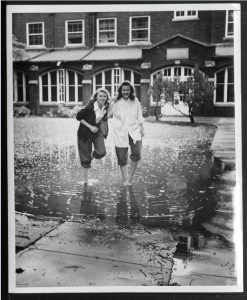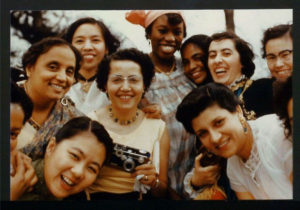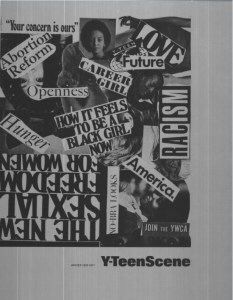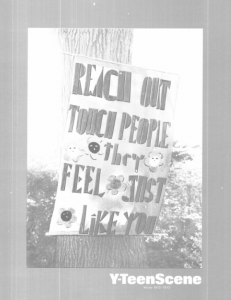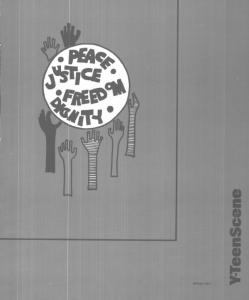Hello All! I’m Gracie Elliott, the Smith College student assistant working with Mandy on the YWCA Digitization project. I started in February 2017 and worked part time for the duration of that semester, went full time over the summer break, and went back to part time once the school year began. As we work through the final stages of the project, and draw closer to the digital release, I have been invited to reflect on my perspectives and experiences being a part of it. When I started with the project a little over a year ago, I came in with an elemental understanding of archival work, and as a complete metadata novice. However, I was fascinated with the prospect of working in an archive, especially one with Smith’s feminist leanings, and thought it would be a useful educational experience to have before I graduated. I didn’t realize how cool it was going to be to assist with a specific project, and how much knowledge I would acquire by the time the project is finished.
My first couple months were spent doing quality control for scans of photographs and serials that we received from the vendors, and learning the basics of metadata as a concept, a tool, a skill, and an academic category. Mandy gave me reading resources so I could understand the basics of “data about data” and the intricacies of building digital language for the organization and categorization of text and content, in the interest of making it accessible. My quality control entry point was thankfully smaller in scope, and I spent the first couple months spot checking to check for consistency and quality in the images, as well as accuracy in the naming and numbering of files. This was an interesting introduction to archival, and metadata work because it let me explore the information, the people and places, that all of the behind-the-scenes metadata work was serving. It was also helpful on a practical level because I became familiar with the content of the YWCA administrative records archive. When it came time to work with metadata explicitly I had a more specific knowledge of the content that Mandy was building the metadata around, and was therefore able to understand what she was showing me how to do, and what questions I needed to ask to ensure that my work was accurate and complete.
I started working explicitly with writing and building metadata when I worked on proofreading and editing metadata sequences that Mandy and others working on the project had been designing. This is largely the kind of work that I have been doing since then, and it is something that I have come to really enjoy. I have interacted with different authority files, and learned to navigate those to distill the information needed to complete metadata sequences. There is also something so satisfying about matching terms to numerical identifiers, and organizing that in relation to the digitized archival content.
Mandy gave me such clear instructions on workflow and process, so I was able to do accurate work before I completely conceptualized what I was working on. In the beginning I didn’t totally understand what I was doing, I just knew I was doing it right. We would check in with each other before and after I came in to work. I asked a million questions, because I always like to ask instead of doing something wrong and repeating a mistake. However, after a while I realized I had picked up the basics of the language, I could navigate the technology with ease, and I began to develop my own personal workflows to maximize my efficiency and improve my accuracy. I would get so sucked into the rhythmic work of looking up IDs, matching them with terms, and scanning the spreadsheets line by line looking for incomplete or incorrect data sequences, I wouldn’t realize that my shifts had ended. It might be nerdy, but I had a lot of fun completing all the tasks.
When I needed a break I would work on social media, or blog posts, which means I could dig through the photos or old serial publications and find images or articles that I found interesting, and do more research on them. I got to learn really intimately what an important organization the YWCA was and continues to be.
As we are wrapping up, and preparing the metadata to ingest in ArchivesSpace, we are bringing other student metadata assistants to work on editing and finalizing the metadata records. I realized just how much I have learned in the year I’ve spent working on the project and in the archive when I had to explain the process to a student new to the project. I was able to explain things to her that I didn’t even realize I understood. I could answer her questions about technical processes (like how to perform certain actions within the spreadsheets) as well as more general information (like where to find the information that we needed in the metadata records, and what it was referring to). I was already familiar with the data we were working with, because I had worked with it for most of the past year, and I understood where the information was coming from, why it was relevant. I was so pleased! My comprehension of the process and the concepts, not just the steps needed to meet each goal is so fulfilling to me. I am so thankful for the skills I have acquired, and the knowledge base that I have been introduced to. I am in awe of all of the people that have been creating records, and organizing data throughout history, and have gained a new perspective on what a feat it is.
I feel doubly lucky to be able to work on the YWCA project specifically because, while it fulfilled my interests in working with archival materials and on archival projects, it also complimented the work I do in my academic fields (Sociology and Study of Women and Gender) and provided historical and contemporary examples of women doing professional activist work that I am interested in doing in my professional life. I also had such a wonderful time getting to have Mandy as a supervisor. She is a remarkable archivist with a passion for the work she does. It has been a pleasure spending time with her and learning from both her example and her instruction.
This has been an excellent learning experience that I will take with me as I move into the next phases of my educational and professional career. I am happy that I can be with the project through to the end, and that I will have been a small part of providing accessibility to an archive of such rich and important history that I can interact with and share with others, with knowledge of the process and hard work that went into creating it.
Below are a few images that have stuck with me. Enjoy!

